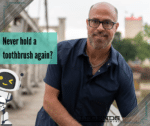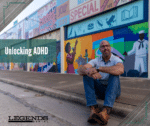
Artificial intelligence is everywhere we turn these days. We tell our Alexa to add stuff to our shopping carts or ask her to play music; automated teller machines have been dispensing our money for years, and self-service machines have been handling our grocery checkouts for at least the last decade.
But although a machine telling you you’re going to lose your teeth may seem like a bit much, even for us dentistry and science nerds, it could be possible in the future.
New research from the Harvard School of Dental Medicine suggests that AI machine-learning tools can help identify individuals at the most significant risk of tooth loss.
The study, published June 18 in the journal PLOS ONE, analyzed five algorithms with various combinations of factors that screen for tooth-loss risk.
The analysis showed that these factors, which include everything from medical conditions such as diabetes and arthritis to characteristics and socioeconomic variables, including race and education, can identify the potential for tooth loss better than clinic dental exams alone.
The Harvard researchers on the project believe their approach can test people worldwide in different health care settings. They also think this AI-based method can be used even by people who are not dentists.
While we’re not so sure about that, there is something we are confident of: losing a tooth, or multiple teeth, can affect an individual’s physical and mental health.
Effects of Tooth Loss
Tooth loss affects quality of life, overall health, well-being, how you eat, self-esteem and even your love life.
In most cases, tooth loss can be delayed or even prevented with early intervention.
Despite this, many individuals with dental health problems do not see a dentist until the chance to save their teeth has passed.
This is where Harvard hopes to help — by identifying those with the highest risk and referring them for further assessment or treatment early.
The researchers used data from nearly 12,000 adults collected by the National Health and Nutrition Examination Survey to develop their machine-learning algorithms. They also used this data to test how well these algorithms predicted both singular and total tooth loss in adults based on socioeconomic, health and medical factors.
One thing to note, the algorithms used by Harvard were designed to assess an individual’s tooth-loss risk without them undergoing a dental exam. But those with a high risk for tooth loss would still be advised to undergo an exam with a dentist.
While the study found that machine-learning algorithm models were more beneficial in predicting tooth loss than those relying on routine clinical exams and dental indicators alone, as dentists, we can say no machine can replace regular visits to the dentist at a dental practice.
Seeing the dentist at least twice a year for professional cleanings and exams is a critical part of protecting your oral health, preventing tooth loss, and slowing down the progression of disease and oral health problems.
Other ways that you prevent tooth loss:
Eating a Tooth-Friendly Diet. This doesn’t just mean avoiding sweets; we recommend adding different types of food to your diet that help prevent tooth decay. One example is crunchy vegetables that help brush away food debris.
Brushing Properly. Do you brush your teeth at least twice per day? You should. Did you also know that you should hold your brush at a 45-degree angle while brushing? How about that you should brush for at least two minutes every time you brush? Also, did you know that you can damage your gums and tooth enamel if you brush too hard?
Floss Every Day. We encourage you to floss at least once per day. We prefer traditional string floss versus water flossers, but either will work – as long as you do them! Flossing regularly helps remove food bits and sticky dental plaque that causes periodontal disease.
Watch What You Drink. Do you drink energy drinks or soda daily? These beverages, along with juices, may damage your tooth enamel and increase acidity in your mouth. They may also increase your risk of gum disease.
Don’t Use Your Teeth as Tools. Teeth are not for opening bottles or tearing open packages.
Protect Your Teeth. We recommend that you wear a mouth guard during sports, even bicycling or inline skating, to protect your teeth if you fall or collide with another individual.
Talk About Teeth Grinding. Do you grind your teeth? You may not even know that you do, as it often happens without your knowledge while you sleep! You may notice signs of grinding such as headaches and worn-out teeth. Teeth grinding can damage your tooth enamel and even cause cracks in your teeth. We can give you a special mouth guard to prevent your habit from breaking your teeth.
Replace Missing Teeth. Tooth replacements, including dental implants and dentures, can help keep your jawbone healthy and your overall oral health intact, which helps to prevent future tooth loss.
Are you missing a tooth? We can help restore your smile. Talk to us about our tooth-replacement options and implant dentistry services and how we can prevent future tooth loss. Call us today!




